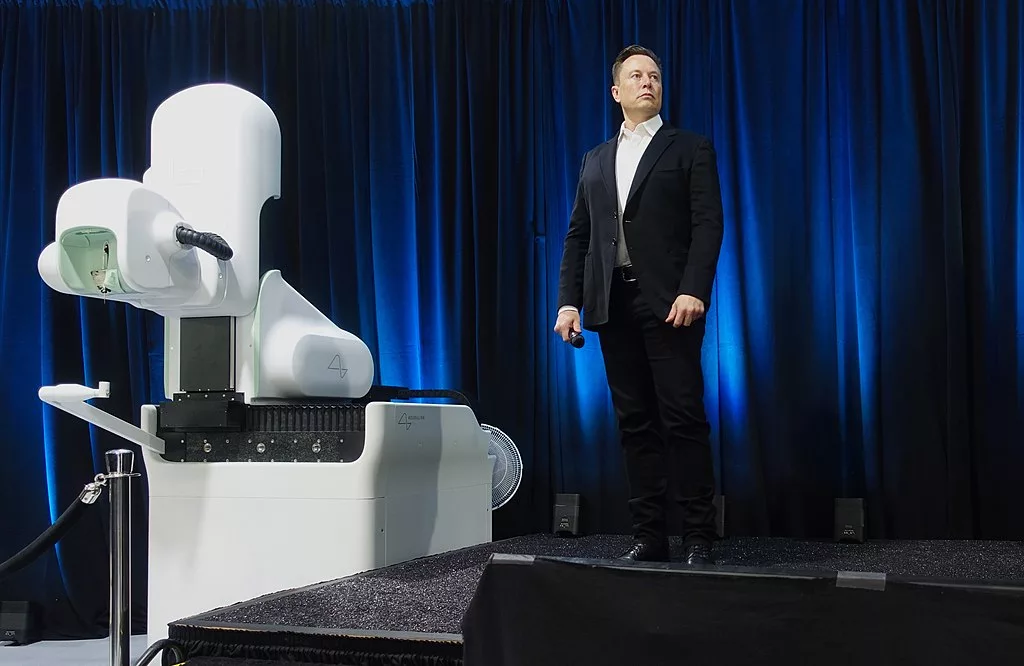Neuralink, a new technology for the brain-computer interface, gets FDA approval. Image credit: Steve Jurvetson, CC BY 2.0, via Wikimedia Commons.
Elon Musk is not afraid of big ideas when it comes to science. One of his newest business ventures, Neuralink—a company building brain implants to ‘unlock human potential’—dominated headlines last month when the start-up announced that it had gained U.S. Food and Drug Administration (FDA) approval for clinical trials in humans.
Despite the company making their device seem like the stuff of science fiction, with press releases showcasing monkeys playing video games with their minds, Neuralink’s implant technology enters an already crowded market of ‘Brain-Computer Interfaces’, some of which are much closer to full FDA approval for commercial use.
Approval for human trials from FDA gives a company permission to gather further information on the safety and efficacy of their medical device in a clinical setting. Companies must submit an investigational plan, and the progress of the study is closely monitored by regulators. The information from these studies can then be submitted as evidence to grant the manufacturer permission to carry out further testing on the road to full approval.
Elon Musk is not afraid of big ideas when it comes to science.
Brain-Computer Interfaces (BCIs) have long been in development, with support from the National Institute of Health through the BRAIN initiative and programmes such as BrainGate, due to their potential for restoring function in individuals with paralysis and other neurological disorders.
The World Health Organisation reports that between 250-500,000 people each year will suffer a spinal cord injury, one of the key causes of paralysis. Within this group, 20-30 % will be diagnosed with depression, as many patients become dependent on caregivers or assistive technology to perform basic tasks.
BCI technology makes restoring full motor function in these individuals an attainable reality in the future through implanting a collection of thin electrodes in the brain (via surgery). Electrical activity is detected and then relayed to an external device that triggers a response such as the movement of a robotic limb or writing text on a computer.
One of Neuralink’s most successful competitors, BlackRock Neurotech, first implanted their device (the Utah Array) in humans in 2004. It has since gained FDA approval for monitoring brain activity for up to 30 days, and enabled patients to control robotic arms, send text messages and regain speech.
Even without full FDA clearance, the Utah Array is an important example of how Brain-Computer Interfaces have the potential to change lives. Beyond restoring motor function in patients, these devices may also be able to assist the diagnosis of neurological disorders through their ability to sensitively detect brain activity.
Other companies such as Synchron (whose technology was given FDA approval for human trials in July 2021), NeuroPace and Precision Neuroscience are also well on their way to developing similar technology that could revolutionise the treatment of several neurological disorders.
Musk’s ultimate ambitions stretch beyond the treatment of medical conditions. He wishes to develop a product for the mass market, where it could allow anyone to ‘save and replay memories’ or ‘control computers and mobile devices with their thoughts’. This presents additional challenges for the company, as mass production eliminates the potential to personalise these devices to the individual and raises ethical issues in the case of malicious use of the technology connected to the implants.
Neuralink also differs from other BCI technology companies in its technical specifications. They claim they are working towards a Brain-Computer Interface that uses much thinner electrodes than other currently tested devices. In fact, these threads are so thin that Neuralink plans on using surgical robots to insert them. With many potential health risks associated with these ultrathin wires, experts remain largely sceptical of Neuralink’s aims.
Emails from Musk to staff indicate his frustration at the slow pace of development, with employees stating that the resultant high-pressure environment is responsible for several errors made.
The approval also comes after a series of controversies leading to US lawmakers recently calling for a probe by the US Department of Agriculture into animal welfare at the company facilities. This follows several incidents reported by company employees where rushed procedures led to excess deaths during animal experiments. Emails uncovered by Reuters from Musk to staff indicate his frustration at the slow pace of development of the technology, with many employees stating that the resultant high-pressure environment has been responsible for several of the errors made.
Crucially, this approval also comes in the wake of an initial rejection by the FDA of their human trial application in early 2022 due to concerns over the safety of the device. It remains unclear which changes have been made to grant the company permission to test this technology in humans now. There are currently no details about the nature of these clinical trials or the number of participants, although Neuralink continues to actively recruit for their patient registry.
Some of the concerns raised by the FDA included the ultrathin threads migrating to other areas of the brain, where they could cause inflammation and rupture blood vessels, and possible damage to brain tissue due to the device overheating or battery failure.
Musk has previously claimed that he is so confident in the device’s safety that he would willingly implant them in his own children—considering the long road to FDA approval rival companies have faced, it remains to be seen how long it will be until Musk’s vision is realised. Several questions also remain about how the outcome of any investigation into animal welfare may affect the company’s abilities to test this technology on humans.
Neuralink’s goal of a universally accessible brain implant with the power to change humankind is likely to remain as science fiction for the foreseeable future.





